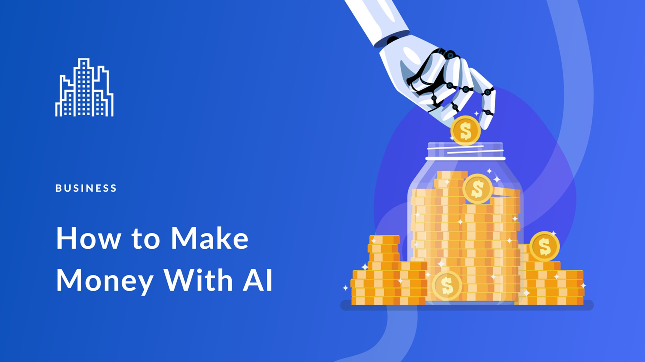Artificial Intelligence (AI) has transformed from a futuristic concept into a practical tool driving innovation and opportunity across industries. By 2025, AI is not just a buzzword but a cornerstone of economic growth, offering countless ways for individuals, entrepreneurs, and businesses to generate income. Whether you're a tech enthusiast, a creative professional, or a business owner, there are numerous avenues to leverage AI for profit. This article explores the most promising ways to make money with AI in 2025, diving into practical strategies, emerging trends, and actionable steps to get started.
1. Developing AI-Powered Applications
One of the most lucrative ways to make money with AI is by developing applications that solve real-world problems. The demand for AI-driven apps spans industries like healthcare, finance, education, and entertainment. For example, AI-powered health apps can monitor patient vitals in real-time, while financial apps can predict market trends with unprecedented accuracy.
How to Start:
-
Learn to Code: Familiarize yourself with programming languages like Python, which is widely used for AI development due to its robust libraries (e.g., TensorFlow, PyTorch).
-
Identify a Niche: Focus on a specific problem, such as creating an AI chatbot for customer service or an app for personalized fitness coaching.
-
Use Low-Code Platforms: If coding isn’t your strength, platforms like Bubble or Adalo allow you to build AI-integrated apps with minimal coding.
-
Monetization Models: Offer your app via subscription models, in-app purchases, or freemium plans. For instance, a language-learning app with AI-driven speech recognition could charge for premium features.
Potential Earnings: Independent developers can earn $50,000–$500,000 annually, depending on the app’s success, while enterprise-grade apps can generate millions.
2. Offering AI Consulting Services
As businesses increasingly adopt AI, the need for expert consultants is skyrocketing. AI consultants help companies integrate AI into their operations, from automating workflows to optimizing supply chains.
How to Start:
-
Build Expertise: Gain certifications in AI and machine learning from platforms like Coursera, edX, or Google Cloud.
-
Specialize: Focus on industries like retail, manufacturing, or marketing to stand out. For example, specialize in AI-driven customer behavior analysis for e-commerce.
-
Network: Attend industry conferences and join online communities on platforms like LinkedIn to connect with potential clients.
-
Offer Tailored Solutions: Provide services like AI strategy development, model training, or system integration.
Potential Earnings: Freelance AI consultants can charge $100–$300 per hour, while established firms may bill $1,000–$5,000 per project.
3. Creating AI-Generated Content
AI tools like text generators, image creators, and video editors have revolutionized content creation. In 2025, businesses and individuals are willing to pay for high-quality, AI-generated content for marketing, entertainment, and education.
How to Start:
-
Master AI Tools: Familiarize yourself with tools like DALL·E for images, MidJourney for art, or Runway for video editing.
-
Offer Services: Create content for clients, such as blog posts, social media graphics, or promotional videos. Platforms like Fiverr and Upwork are great places to start.
-
Develop a Niche: Specialize in areas like AI-generated NFT art or personalized video ads for e-commerce.
-
Scale with Automation: Use AI to automate content workflows, allowing you to take on more clients.
Potential Earnings: Freelancers can earn $500–$5,000 per month, while agencies leveraging AI content tools can generate six-figure revenues.
4. Building AI-Driven E-Commerce Solutions
E-commerce is a goldmine for AI applications. AI can enhance customer experiences, optimize pricing, and streamline operations, making it a powerful tool for online retailers.
How to Start:
-
Personalization Engines: Develop AI algorithms that recommend products based on user behavior. For example, an AI tool could suggest outfits based on a customer’s browsing history.
-
Dynamic Pricing: Create tools that adjust prices in real-time based on demand, competition, and inventory levels.
-
Chatbots: Build AI-powered chatbots for customer support, reducing response times and improving satisfaction.
-
Partner with Platforms: Integrate your solutions with platforms like Shopify or WooCommerce to reach a wider audience.
Potential Earnings: AI-driven e-commerce tools can be sold as SaaS products, generating $10,000–$100,000 monthly for successful startups.
5. Monetizing AI in Education
The education sector is embracing AI to deliver personalized learning experiences. From AI tutors to adaptive learning platforms, there’s a growing market for educational AI tools.
How to Start:
-
Develop AI Tutors: Create virtual tutors that adapt to a student’s learning pace and style, covering subjects like math or language.
-
Create Learning Platforms: Build platforms that use AI to generate customized lesson plans or quizzes.
-
Partner with Institutions: Collaborate with schools, universities, or online learning platforms like Udemy to integrate your tools.
-
Monetization: Offer subscription-based access or license your tools to educational institutions.
Potential Earnings: EdTech entrepreneurs can earn $50,000–$1 million annually, depending on the scale and adoption of their solutions.
6. AI in Financial Services
AI is transforming finance through applications like algorithmic trading, fraud detection, and credit scoring. These tools are in high demand by banks, fintech startups, and individual investors.
How to Start:
-
Algorithmic Trading Bots: Develop AI bots that analyze market data and execute trades automatically.
-
Fraud Detection Systems: Create AI models that identify suspicious transactions in real-time.
-
Credit Scoring Tools: Build AI-driven tools that assess creditworthiness using alternative data sources, like social media activity.
-
Market Your Solutions: Target fintech startups or small banks looking to enhance their operations.
Potential Earnings: AI solutions in finance can yield $100,000–$10 million annually, depending on the client base and tool complexity.
7. AI-Powered Marketing and Advertising
AI is revolutionizing marketing by enabling hyper-targeted campaigns, predictive analytics, and automated ad creation.
How to Start:
-
Ad Optimization Tools: Develop AI tools that optimize ad placements for maximum ROI.
-
Customer Segmentation: Create AI models that segment audiences based on behavior and preferences.
-
Content Automation: Offer AI-driven tools that generate ad copy, social media posts, or email campaigns.
-
Freelance Services: Provide AI-driven marketing services to small businesses or agencies.
Potential Earnings: Marketing AI tools can generate $5,000–$50,000 monthly for freelancers and millions for SaaS companies.
8. Selling AI-Generated Digital Products
AI can create unique digital products like artwork, music, or even virtual real estate for the metaverse, which can be sold as NFTs or licensed assets.
How to Start:
-
Create Digital Art: Use AI tools to generate unique artwork and sell it on platforms like OpenSea or Rarible.
-
Produce Music: Leverage AI music generators to create royalty-free tracks for content creators.
-
Design Virtual Assets: Develop AI-generated 3D models or environments for virtual worlds.
-
Market Your Work: Promote your products on social media and NFT marketplaces.
Potential Earnings: Successful digital artists can earn $1,000–$100,000 per month, depending on demand and exclusivity.
9. Training and Reskilling Others in AI
As AI adoption grows, so does the demand for education. Teaching others how to use AI tools or develop AI solutions is a profitable opportunity.
How to Start:
-
Create Courses: Develop online courses on platforms like Udemy or Teachable, covering topics like AI basics or advanced machine learning.
-
Offer Workshops: Host live workshops for businesses or individuals looking to upskill.
-
Write Guides: Publish eBooks or blogs on AI topics and monetize through ads or sponsorships.
-
Certify Your Expertise: Gain credibility through certifications or partnerships with tech companies.
Potential Earnings: Course creators can earn $1,000–$50,000 monthly, while corporate trainers may charge $5,000–$20,000 per session.
10. Ethical Considerations and Challenges
While AI offers immense opportunities, it’s crucial to address ethical considerations like bias, privacy, and job displacement. Ensuring your AI solutions are transparent and fair can enhance their marketability.
Key Steps:
-
Audit Algorithms: Regularly test your AI models for bias and inaccuracies.
-
Prioritize Privacy: Comply with regulations like GDPR or CCPA to protect user data.
-
Upskill Workers: Offer training programs to help workers adapt to AI-driven changes.
Getting Started: Practical Tips
-
Invest in Learning: Dedicate time to understanding AI concepts and tools. Free resources like YouTube tutorials or paid courses can accelerate your journey.
-
Start Small: Begin with low-cost projects, like offering freelance services, before scaling to larger ventures.
-
Leverage Communities: Join AI communities on platforms like Reddit or Discord to stay updated and network.
-
Stay Updated: Follow AI trends through blogs, podcasts, and industry reports to remain competitive.
Conclusion
In 2025, AI is a powerful engine for wealth creation, offering opportunities for everyone from coders to creatives. Whether you’re developing apps, consulting for businesses, or creating digital art, the key is to identify a niche, build expertise, and deliver value. While challenges like ethical concerns and market saturation exist, the potential rewards far outweigh the risks. By starting small, staying informed, and embracing innovation, you can turn AI into a sustainable source of income. The future is here—seize it!




